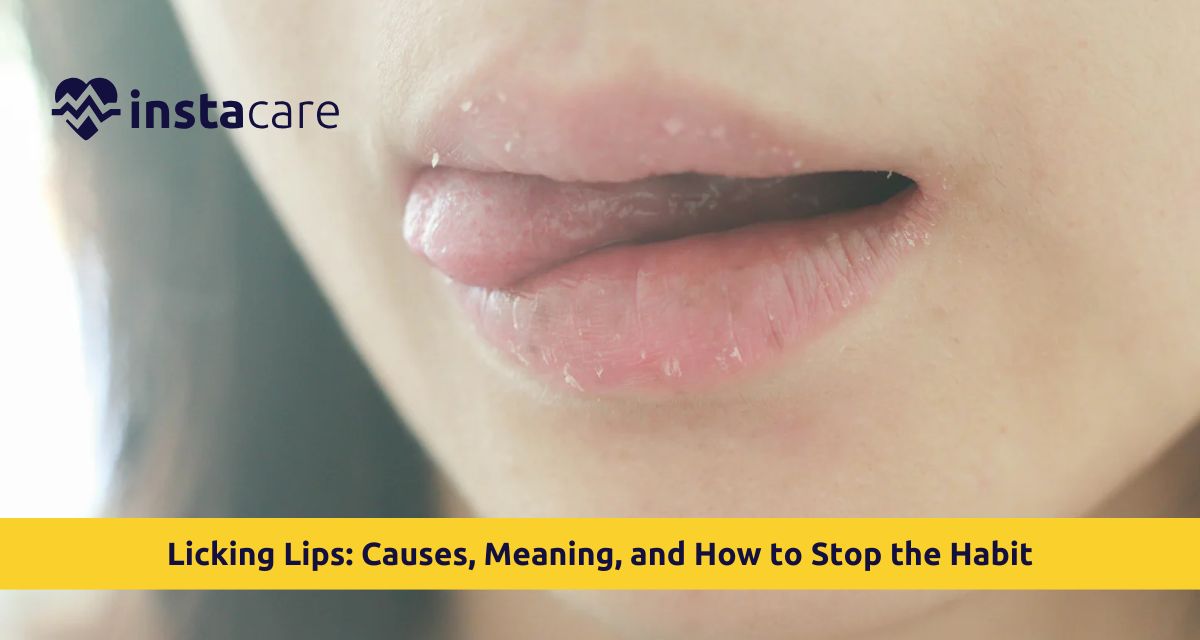What Does Licking Lips Mean?
Licking your lips appears to be a neutral action, but its meaning is normally contextual and trigger-related.
Body-clothing-language-wise, the behavior could mean nervousness, eagerness, or desire. It is often utterly subconscious and means what one doesn't say, which is why experts often explain it as licking lips body language meaning in certain contexts.
For some others, the activity is causally linked to stress and tension. Like with nail biting or fidgeting, lip licking is a coping response to lip licking and anxiety that momentarily generates a sense of relief in the midst of
anxiety.
For others, the activity is actually reversed into a nervous constant lip licking habit, a ritualistic, automatic action people themselves are not even aware of doing.
Even apparently harmless on initial glance, lip licking habit will annoy lip and mouth skin and make it susceptible to infection such as lip licking dermatitis, causing the skin near the mouth to be red, dry, and sore.
Common Causes of Lip Licking
Human habits of lip licking are conditioned by many different causes. Among the most prevalent causes are:
- Dry Lips and Dehydration: Dehydrated status and dry lips create a lip licking syndrome. But only dries them out. Lip licking and dehydration travel together, so saliva dries out and lips become drier and drier.
- Anxiety or Stress: Stress and lip licking are double cousins. It is an automatic tension relief survival strategy. The majority of the people will find themselves licking their lips as a habit in times of stress without realizing it. This link between lip licking and stress often explains why it becomes more noticeable during high-pressure situations.
- Habitual or Compulsive Behavior: Lip licking is a conditioned long-term habit. Sometimes, it develops into habitual lip licking disorder or even compulsive lip licking, where the individual repeatedly engages in it without control.
- Environmental Factors: Dryness of lips due to cold air, dry indoor air, or wind. Temporary relief from licking but it aggravates.
- Childhood Habits: Lip licking is a common illness in children, especially in winter. Redness and swelling of the area around the mouth known as "lip licker's dermatitis" in children are classic examples of excessive lip licking in children.
- Medical Diseases: Some diseases such as eczema or allergy cause inflammation of the lips due to which excessive licking occurs.
Read More: Laser Treatment For Dark Lips - All You Need To Know
Side Effects of Excessive Lip Licking
Licking is not harmful if done only once, but repeated action every day creates a package of problems:
Dry, Chapped Lips
Saliva has enzymes which dry and chafe the skin, causing dryness to the lips. It creates a wetness-dryness cycle, which is why lip licking causes chapped lips and worsens irritation.
Lip Licking Dermatitis
Repeated daily irritation creates lip licking dermatitis, in which redness, cracks, and inflammation-like appearance skin is developed around the mouth.
Infections
Dryness of the skin makes one susceptible to bacterial or fungal infection.
Discomfort and Pain
Pain, burning, or bleeding of dry lips while eating and speaking.
Psychological Effect
Excessive licking of the lips outside would be an ego-brusher for someone, especially when other individuals also have the same habit.
How to Prevent the Habit of Lip Licking?
How to stop licking lips is a matter of awareness, treatment, and lifestyle modification. The following are positive ways to stop:
Stay Hydrated
Because lip licking and dryness go together, sipping lots of water keeps lips naturally hydrated. Keep a refillable water bottle on hand to remain hydrated throughout the day.
Use Lip Balm
Sealing the lips with a protective ointment or balm creates a barrier to licking. Apply balms with shea butter, beeswax, or
petroleum jelly. Fragrance-laden balsams must be avoided since they trigger licking.
Coping with Anxiety and Stress
If stress and lip licking are the offenders, try stress-control interventions like yoga, meditation, or relaxation through deep breathing. Lip licking compulsion secondary to anxiety can be treated with counseling.
Awareness of Behavior
First, we break any habit by becoming aware. Notice when you lick lips, during speech, at night, or while being nervous. Substitute it with healthier habits like a sip of water or pressing the lips together. Some people also report lip licking in sleep, which can be managed with protective balms.
Home Remedies for Lip Licking Damage
- Honey: Antibiotic in nature and soothing to chapped lips.
- Aloe Vera: Anti-inflammatory and healing.
- Coconut Oil: Keeping lips moistened and preventing re-drying of lips. These home remedies for lip licking damage are effective when used along with medicated balms.
Kids and Breaking a Habit
Repeated lip licking by children is prevented using unflavored lip balm and diversion (sucking sugarless gum, etc.). No scolding is given but parents remind them politely.
Medical Treatment
If the issue gets worse into lip licking dermatitis, consult a dermatologist. Treated irritated skin can require prescription ointment or cream. In severe cases, doctors may recommend lip licking and dry lips treatment with specialized creams.
Lip Care at Night
There are night lickers of lips. A balm applied at night that moisturizes will keep lips moist at night.
Conclusion
Lip licking is not bad except for habitual lip licking. Habitual lip licking can cause habitual problems like parching of lips, dermatitis, and infection. Happily, awareness, moisturizing, and protective treatment will be in a position to stop the cycle.
If at any time you caught yourself wondering, "Why do lips get licked?" the reasons are usually dryness, tension, or habit. By adding good habits to your routine, using the right products, and simply observing what you are doing, you can protect your lips and have a healthy, confident smile.
Please book an appointment with the
best Dermatologist ist in Lahore, Karachi, Islamabad, and all major cities of Pakistan through
InstaCare, or call our helpline at 03171777509 to find the verified doctor for your disease.

